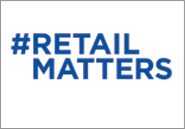Retail is the largest private sector employer in New Brunswick.
Find out why #RetailMatters to New Brunswick.
12%
of New Brunswick’s workforce works in Retail. That’s 44,200 Canadians.
3400
storefronts in New Brunswick
60%
of retailers are small businesses
$1.5 Billion
in total annual salaries paid
$20.75/HR
New Brunswick’s average hourly compensation in retail
$7.6 Billion
in Core Retail Sales
Source: Stats Canada
Why New Brunswick Retail Matters

New Brunswick retailers have faced head-on the incredible and devastating financial challenges of COVID-19. When your local candidates knock on your door or you meet them at an event, take time to share your experiences and view of New Brunswick’s retail industry.
Be sure to also let candidates know that you are part of New Brunswick’s largest private employment sector and that retail also has a significant impact on the success of several other industries such as transportation, construction, property management, information technology and financial services.
Here are some ideas that you can share with your candidates while spreading the word about retail:
- More than one in every ten jobs in New Brunswick is in retail.
- 60% of all retailers are small businesses (less than 10 employees).
- Retail in New Brunswick pays $1.5 billion in total annual compensation.
Every election provides the electorate with the ability to shape their government and help to ensure that future members of the Legislative Assembly understand the role merchants play in New Brunswick’s lives and our economy.
Where the Parties Stand

Retail Council of Canada sent a questionnaire to the leading political parties addressing the key issues affecting retail in the province.
Retail Survey Questions
- Will your party pledge to work with the Retail Council of Canada to develop and implement a COVID-19 retail recovery economic strategy? For years, other industries have received government incentives for investing in people, technology and e-commerce.
- Is your party prepared to maintain the current model of determining annual minimum wage adjustments through a formula that is linked to CPI?
- Will your party pledge to not raise corporate taxes (small and large businesses) or the HST during your mandate so as to maintain New Brunswick’s tax advantage within Atlantic Canada?
- Will you take steps to ensure foreign eCommerce sellers begin to pay their fair share of taxes and eco-fees?
- Would your government provide refundable tax credits to assist with COVID-19 related store renovations and purchases of PPE in order to protect employees and customers in retail stores?
- Would your government restore the balance between employers and labour by repealing first contract arbitration and legislating secret ballot votes for union certification?
- Would your government be prepared to lead on issues related to environmental stewardship so as to avoid a municipal patchwork? (e.g. municipal governments and solid waste commissions taking action on single use plastic bags)
- Would your government take action to harmonize policies related to solid waste regulations across Atlantic Canada?
Thank you for your e-mail and the questions you have forwarded on behalf of the Retail Council of Canada. As you can appreciate, we are receiving a large volume of surveys and questionnaires which we are attempting to respond to in a timely manner. Our platform was released a few days ago and addresses a number of issues you raise.
First, I would like to thank all the retailers and those working in your industry throughout the province for the role you have played in our response to the COVID-19 pandemic. The pandemic changed almost overnight how your businesses operate and we understand the stress and financial pressures you and your employees are under because of the measures that were taken to control the virus.
As for your specific questions, with regards to a recovery strategy we believe the province can and should be doing more to help. We will create a COVID-19 Economic Recovery Task Force to put in place a short, medium, and long-term action plan, with a report to be completed within 30 days if we able to form government. Retailers are among the hardest hit by the pandemic, and I can guarantee we will seek your input into what actions need to be taken and address your concerns in that action plan. That would include helping you absorb the costs of COVID related expenses, which you also reference in your letter.
We agree it is important to have predictability regarding minimum wage adjustments and we are not considering changing the process currently in place.
We have committed to not raising taxes.
We have not directly addressed the issue of eCommerce sellers from outside the country or unionization in our platform but I can commit to working with you to address your concerns in these areas upon election. With 44,000 employees in the province we understand the importance of the retail sector. We also agree with your statement that it’s important to respect the rights of those employees to organize and seek a fair wage. My approach would be to work together with all stakeholders and look for a path forward that is mutually beneficial.
We do commit to taking action to harmonize solid waste regulations regarding environmental stewardship. We specifically refer to the harmonization of regulations throughout Atlantic Canada in our platform.
Thank you for your interest in our plans for the future. Working together with business to grow our economy is one of the major themes of our platform and we’re excited to get going and work with the Retail Council of Canada and others to build a more robust New Brunswick in the future.
Thank you again for the critical role you have played in helping New Brunswickers deal with the current pandemic. We are all in this together and we are committed to helping you weather the impact of the pandemic and grow stronger than ever as we adjust to the new normal.
Sincerely,
Kevin Vickers
New Brunswick Key Retail Issues
Develop retail sector strategy

Retailers are resilient and despite unprecedented challenges brought on by COVID-19, continue to fight to remain a viable and essential element of the province’s economy.
COVID-19 has created significant disruption to New Brunswick’s retail sector that historically has provided a $13 billion boost to the economy, and over 42,000 jobs. Beyond COVID-19, New Brunswick retailers are facing significant cumulative costs and competitive pressures. In the modern age of retail, there is no certainty of continued success as national, online, and offshore channels threaten ‘brick-and-mortar’ New Brunswick stores.
Recommendation
Work with Retail Council of Canada to develop a proper retail recovery strategy, commensurate with the size of the retail industry. While other industries have been the focus of sector strategies and incentives, the retail industry has long been overlooked. The ongoing costs stemming from the COVID-19 pandemic (including health order requirements) have created increased pressure on the province’s retail sector. RCC is calling on the government to be a collaborative partner in finding solutions.
Maintain predictable minimum wage

New Brunswick has established a predictable model for calculating annual minimum wage adjustments based on the Consumer Price Index. The approach helps ensure politics are removed from the process, and that increases fairly balance the interests of employees and employers. Dramatic and rapid increases, such as those seen in Alberta and Ontario have been shown to harm opportunities for those with the least experience, especially youth.
Recommendation
Maintain the current CPI linked approach to minimum wage adjustments so as to ensure a transparent, predictable formula and adequate lead time for budget planning.
Maintain the province’s tax advantage

New Brunswick has an advantage in attracting business to the province through offering the lowest corporate tax rates (14% for large businesses and 2.5% for small businesses) in Atlantic Canada. The province’s Harmonized Sales Tax (HST) is equal to that in the other Atlantic provinces. This tax advantage helps entice businesses to the province.
Recommendation
Commit to not raising corporate tax rate or the HST during your mandate.
Ensure eCommerce sellers pay their fair share

The pandemic has resulted in significant increases in online sales, primarily benefiting non-resident, foreign eCommerce sellers. Those retailers have lower property and labour costs than brick and mortar provincial sellers, and generally provide their employees significantly lower pay and benefits. They also employ no New Brunswickers. Many non-resident eCommerce entities sell into the province without paying eco-fees, yet the packaging for their shipments and products; as well as the products themselves at end-of-life, are discarded into our recycling system. Governments are currently paying these costs. However, with the upcoming launch of an Extended Producer Responsibility (EPR) program for packaging, New Brunswick’s brick-and-mortar retailers will be paying these costs on behalf of their competition. This process ultimately subsidizes foreign online sellers, from the United States, Asia and beyond.
Recommendation
eCommerce sellers from outside Canada need to pay their fair share of taxes and fees. New Brunswick citizens and New Brunswick retailers should not be forced to subsidize foreign eCommerce sellers who are taking a free ride on the backs of local businesses.
Provide refundable tax credits for COVID-19 related purchases

One direct way that the New Brunswick government can help support struggling small businesses is through the introduction of refundable tax credits to help lessen the cost impact of COVID-19 related store renovations and purchases of PPE.
Local retailers, and the business community, are facing severe challenges and need immediate assistance. Tax deductions do not provide immediate help whereas refundable tax credits would have a more beneficial impact. Costs tied to PPE equipment for staff, increased safety training, and other resources are necessary, but create a substantial expense at a time when finances are being squeezed.
Refundable tax credits would provide substantial assistance in helping retailers create and maintain a safe retail environment for their employees and customers.
Recommendation
We urge government to use refundable tax credits up to a certain limit, as a way to provide practical assistance to companies incurring eligible COVID-19 expenditures.
Balance labour laws and ensure secret ballot votes for union certification

RCC does not dispute the rights of workers to form a union and to negotiate with their employer on a first contract. However, there needs to be balance in this process and each side needs to assume some risk. In New Brunswick, first contract arbitration takes the risk away for workers during the certification process and puts it all on the employer. Furthermore, the province does not offer secret ballot voting when workers vote in a union certification. This creates an undemocratic environment whereby workers could be coerced during the certification process.
Labour costs are a significant expense to any business and a contributing factor in a businesses’ decision to locate or expand in a certain province. Retailers value their employees and given the competitive nature of the retail sector, they are constantly challenged with providing competitive compensation while competing in a competitive industry with traditionally low profit margins. Successful retailers work hard to achieve this balance and Retail Council of Canada includes both unionized and non-unionized members. First contract arbitration could upend this balance by allowing a third party to set wages and working conditions in a retailer’s business.
Recommendations
Given the economic challenges that continue to exist in New Brunswick, the government should restore the balance between employers and labour by repealing first contract arbitration and allowing secret ballot votes for union certification. A secret ballot vote is the best way to ensure that union certification is the true desire of employees.
Provide provincial leadership on issues related to environmental stewardship

Over the past few years, the provincial government has not always provided leadership in environmental stewardship. With regards to single use plastic bags, the provincial government’s refusal to provide direction led to a confusing patchwork of municipal initiatives from municipal governments and solid waste commissions. In setting up the province’s electronics stewardship program, the government ignored the suggestions from industry and implemented a program that is not harmonized with best practices in the rest of Canada. Such actions have needlessly created public confusion, administrative red tape and increased costs for businesses in the province.
Recommendations
As the province has already consulted on these issues, the government should take action to harmonize its policies related to solid waste regulations and stewardship programs across Atlantic Canada.
Get Involved

1. Find your candidates
Learn about your local candidates by visiting the party websites:
- The Green Party of New Brunswick
- The Liberal Party of New Brunswick
- The New Democratic Party of New Brunswick
- The Progressive Conservative Party of New Brunswick
- The People’s Alliance Party of New Brunswick
Use the Elections New Brunswick tool to find candidates and their contact info for your riding.
2. Print your sign
Show your pride in retail by posting a photo of your retail staff holding a #RetailMatters sign or a photo of your store.

3. Tell candidates #RetailMatters
Use these links to send parties your staff photos or customized tweets.
- The Green Party of New Brunswick – @GreenPartyNB
- The Liberal Party of New Brunswick – @NBLA_ALNB
- The New Democratic Party of New Brunswick – @NBNDP_NPDNB
- The People’s Alliance Party of New Brunswick – @PANB_AGNB
- The Progressive Conservative Party of New Brunswick – @pcnbca
Contributing to political parties – what you need to know
Contributing to a campaign can be an effective way to build relationships with candidates in your riding.
Make sure that you understand the rules before lending your support to a provincial political party and its campaign. Here is a quick summary:
Who can contribute?
Only individuals can make contributions. There are no residency requirements for individuals wishing to make a contribution.
What is the contribution limit?
The maximum contribution by any individual is $3000 total and includes both monetary and non-monetary contributions as well as financing (e.g. loan guarantees, line of credit). The contribution limit covers the pre-campaign period as well as during the campaign.
How can a contribution be made?
The contribution is made to either a registered political party or the party’s electoral district association.
Who can receive contributions?
Contributions must be made through the Official Representative of the political party or the Official Representative of the electoral district association. The Official Representative for the political party is ultimately responsible for keeping a complete record of each contribution (e.g. name of the recipient) and for issuing tax receipts.
What are the restrictions?
An Official Representative cannot accept more than $100 in cash from any contributor in a calendar year.
Individuals cannot contribute more than $3000 (see above) and donations are prohibited from organizations (corporations, partnerships, trade unions) or anonymous donors. An individual is exempt from reporting up to $100 in donations in kind in a calendar year, but the Official Representative must track all donations in kind contributions to ensure an individual does not exceed their limit.
Sections 1(1)-50(6) of the Political Process Financing Act provide additional information regarding monetary and non-monetary contributions to political campaigns. View more information.
Sections 2.8.3-2.8.7 and Sections 3.1.2-3.1.2.4 of the Provincial Political Financing Manual also provide additional information. View more information.
Contact Us

For questions or to find out more, contact Jim Cormier, Director, Government Relations (Atlantic) jcormier@retailcouncil.org or 902-422-4144.
